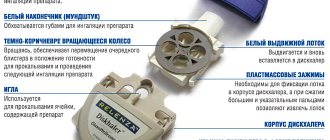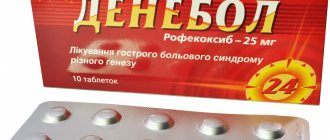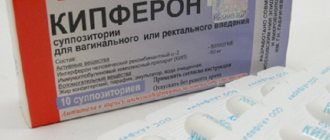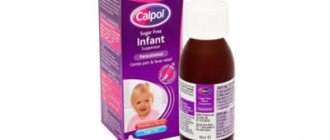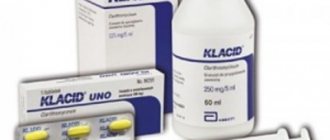pharmachologic effect
The product normalizes the functions of the digestive system. Liquid Intesti-bacteriophage has a specific antibacterial effect against a number of bacterial strains. In the process of exposure, Intesti-bacteriophage lyses specifically these bacteria, attaching to their membranes. Then it penetrates inside the cell, after which it multiplies using the energy resource of the bacterial cell. After the cell dies, mature phage particles are released, which can infect other cells of the strain.
The drug is strictly specific to homologous bacteria, so normal microflora is not suppressed and there is no harmful effect on the cells of the body. Intesti-bacteriophage stimulates immunity , effectively improves the condition of purulent-septic diseases that are accompanied by immunosuppressive conditions. Before starting treatment, the phage sensitivity of the pathogen should be determined.
What kind of medicine is this?
Intesti-bacteriophage is a medicine from the group of immunobiological agents with an antibacterial effect. The components from its composition not only eliminate microorganisms that are causative agents of diseases of the gastrointestinal tract, but also have a preventive effect, increasing the natural protective functions of the child’s body. The risk of relapse of the disease within a short period of time becomes minimal.
Peculiarities:
- does not have a negative effect on the intestinal microflora;
- the components included in the composition do not affect the central nervous system;
- Before starting a course of treatment, it is recommended to carry out a procedure for determining the phage sensitivity of the pathogen.
Instructions for use Intesti-bacteriophage (Method and dosage)
The instructions for Intesti-bacteriophage stipulate that the medicine can be used orally and rectally. Before using the solution, you need to shake the container and examine the contents. If particles are found in it, the transparency or color changes, in this case the drug cannot be used.
Instructions for use of Intesti-bacteriophage stipulate that when using the drug, you must first wash your hands and treat the bottle cap with an antiseptic. You can't leave it open. The required amount of solution must be drawn up with a sterile syringe. The exact period of time treatment should last is determined by the doctor in each individual case.
If children develop side effects when treated with Intesti-bacteriophage, the product can be diluted with water. If severe vomiting is observed, the drug is administered rectally to the person.
For children under 6 months, a single dose is 5 ml (orally) and 10 ml (rectally). Children 6-12 months old are prescribed a single dose of 10-15 ml (orally) and 20 ml (rectally). For children 1-3 years old, a single dose of 15-20 ml (orally) and 20-30 ml (rectally) is indicated. Children 3-8 years old should receive a dose of 20-30 ml (oral administration) and 30-40 ml (rectal administration). Patients over 8 years of age and adults should take 30-40 ml orally and 50-60 ml rectally.
The drug is prescribed orally 4 times a day, it should be taken one hour before meals.
If the solution is prescribed for prophylactic purposes, one single dose per day is indicated. Treatment is prescribed at the first symptoms, as a rule, it is carried out for 7-10 days.
Release form and composition
Dosage form - solution for oral or rectal administration: transparent liquid from light yellow to yellow, a greenish tint is allowed (in bottles: 20 ml, in a cardboard pack of 4 or 10 bottles; 100 ml, in a cardboard pack 1 bottle) .
The Intesti-bacteriophage contains:
- active ingredients: mixture of sterile filtrates of phagolysates of Shigella flexneri 1, 2, 3, 4, 6 serovars, Salmonella paratyphi A, Shigella sonnei, Salmonella paratyphi B, Salmonella infantis, Salmonella typhimurium, Salmonella choleraesuis, Salmonella enteritidis, Salmonella oranienburg, Proteus mirabilis, Proteus vulgaris, Enterococcus, Pseudomonas aeruginosa, Staphylococcus, various serogroups (the most significant in the etiology of enteric diseases) of enteropathogenic Escherichia coli;
- auxiliary component: quinosol.
Analogues of Intesti-bacteriophage
Level 4 ATC code matches:
Cystamine
Neovasculgen
Plantain juice
Acizol
Leucovorin
Lymphomyosot
Sodium thiosulfate
Galium-Hel
Dicarbamine
Spascuprel
Methylene Blue
Ammonia
Mucosa Compositum
Coenzyme Compositum
Ubiquinone Compositum
Dimephosphone
Unithiol
Naloxone
Oscillococcinum
Dantinorm Baby
Drug analogues are drugs that have a similar effect on the body. To choose them, you must always consult a doctor.
Mechanism of action
The components that make up the Intesti-bacteriophage destroy parasitic microorganisms belonging to the group of pathogens of a wide variety of diseases of the digestive system. These include staphylococci, proteus, E. coli and salmonella. The combination of certain elements allows not only to speed up the healing process, but also to provide a long-term therapeutic effect.
The mechanism of action consists of the following properties:
- normalization of the functioning of the digestive system;
- strengthening the gastrointestinal tract;
- destruction of pathological microorganisms;
- specific lysis of bacteria included in the composition;
- strengthening the immune system;
- sanitation of the urinary tract;
- destruction of bacterial cells from the inside;
- antibacterial effect on the body;
- impact on the focus of the inflammatory process;
- improvement of the general condition of the body.
Reviews about Intesti-bacteriophage
Parents leave positive reviews about Intesti-bacteriophage after using it rectally and orally. Basically, the medicine is prescribed for dysbiosis , and with its help it is possible to restore the functioning of the gastrointestinal tract in children. According to many parents, the improvement in condition was confirmed by appropriate tests. But in some cases there was no improvement, and there was even some deterioration in the children’s health. However, in most cases the medicine worked. To get results, doctors recommend that the sensitivity of pathogens be determined before treatment.
special instructions
Do not use a cloudy drug - this indicates the presence of bacteria from the environment in it.
Since the drug contains a nutrient medium for the development of bacteria, strict adherence to aseptic rules is required when opening the bottle. After thoroughly washing your hands, use an alcohol-containing solution and remove the cap without opening the cap. Do not allow the inner surface of the cork to come into contact with any objects. When reusing the contents of the bottle (if small doses are prescribed), it is recommended to take the solution with a sterile syringe and close it tightly with a stopper.
After opening, the bottle is stored only in the refrigerator; the bacteriophage can be used throughout the shelf life if there is no turbidity.
Directions for use for children
It is recommended to take at least thirty minutes before eating. The course of therapy can be adjusted by a doctor, but in most cases it is limited to ten days. When treatment is started from the moment the first symptoms of the disease appear, the effectiveness of the medicine increases.
The medicine can be given to children from the first days of life , but for infants Intesti-bacteriophage must first be dissolved in a small amount of water. It can be administered rectally or orally.
Reception regimen for children:
- children from the first days of life to six months are prescribed 5 ml orally and 10 ml rectally;
- for children from six months to one year, the dosage is increased to 10-15 ml orally and 20 ml rectally;
- for children from one year to three years, a single dosage is 15-20 ml orally and 20-30 ml rectally;
- children from three to eight years old are prescribed 20-30 ml orally and 30-40 ml rectally;
- for children over eight years of age, the dosage is increased to 30-40 ml orally and 50-60 ml rectally.
It is recommended to take Intesti-bacteriophage three or four times a day orally or once a day rectally. In most cases, it is administered rectally to infants. The solution is used for enemas. It is recommended to carry out the procedures through gas tubes or catheters.
These methods are used because of the high risk of a gag reflex when taking the drug orally. If the child does not experience any side effects, it can be taken orally.
Analogs
There are many analogues of Intesti-bacteriophage in terms of pharmacological action. The selection of such drugs should be carried out by a pediatrician . Despite the similarities in indications for use, these medications may differ in contraindications and dosage regimen for children.
Incorrect selection of medications for the treatment of diseases of the digestive system can cause complications.
The following drugs are analogues:
- Sextaphage (analogue in composition and pharmacological action);
- Staphylococcal bacteriophage (has identical indications and pharmacological effects);
- Ersefuril (a medicine used to treat diseases of the digestive system caused by pathogenic microorganisms);
- Incena (belonging to the group of homeopathic remedies);
- Spascuprel (an antispasmodic agent with a complex effect on the body).
Indications for use
Intesti-bacteriophage is used to treat diseases of the gastrointestinal tract caused by pathogenic microorganisms and as a prophylactic agent for such conditions. Children are allowed to use from the first days of life.
Before using the medicine, it is recommended to consult your pediatrician. Some diseases of the digestive system require complex and long-term treatment.
Indications for use are the following conditions:
- enterobiasis;
- salmonellosis;
- dyspepsia of various forms;
- purulent skin infections;
- bacterial dysentery;
- typhoid fever;
- enterocolitis;
- colitis (regardless of the stage of development of the disease);
- paratyphoid A and B;
- damage to mucous membranes as a result of exposure to pathogenic microorganisms;
- diseases of the upper respiratory tract caused by pathogenic microorganisms;
- dysbiosis.
Contraindications and side effects
There are practically no contraindications for Intesti-bacteriophage.
The exception is if the patient has an individual intolerance to individual components included in the composition.
This condition can arise due to the characteristics of the child’s body, his age and the general clinical picture of his health.
Side effects from taking it in a child may include the following conditions:
- allergic skin reaction;
- increased regurgitation reflex;
- pain in the stomach;
- slight increase in body temperature;
- uncontrollable vomiting.
Composition and release forms
Intesti-bacteriophage is available in the form of a solution. The glass container is closed with a rubber lid and additionally placed in a cardboard package. The volume of the bottles can be 20 or 100 ml.
Some manufacturers produce it in the form of four or ten tubes packed in one box. The composition of the drug does not change.
The composition includes the following components:
- a mixture of Sonne and Flexner phagolysates;
- serological groups of strains of the most common pathogenic microorganisms;
- quinosol as a preservative.

